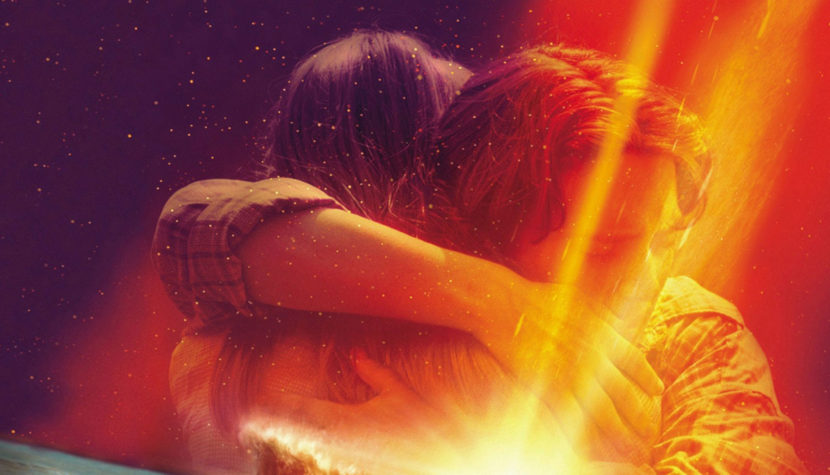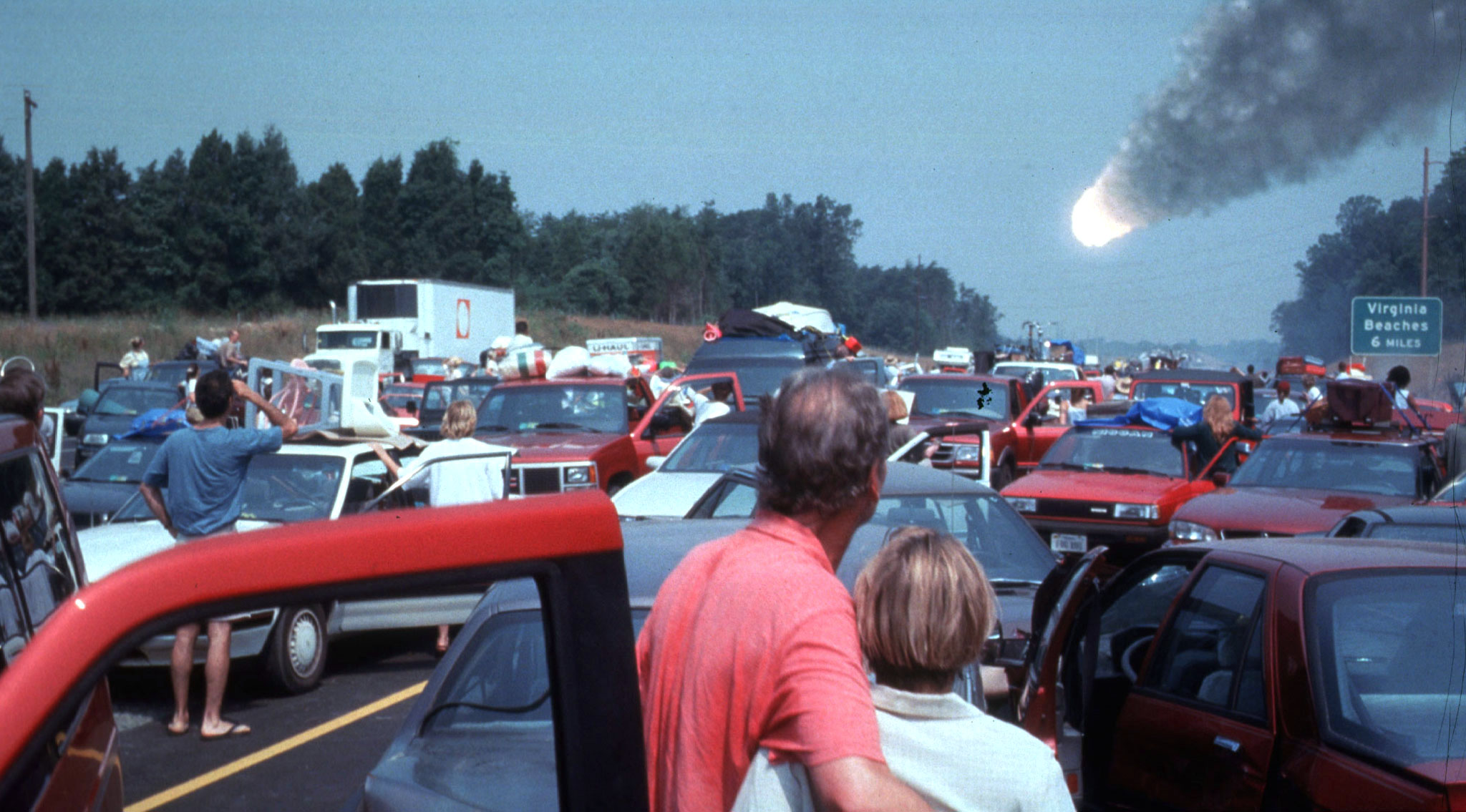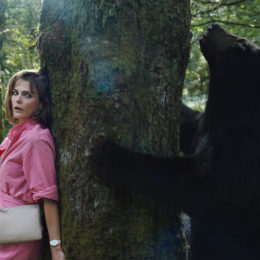DEEP IMPACT. The Exemplary Disaster Movie

Americans are an interesting people. I don’t think I’m wrong if I say that no other nation, with the help of the film medium, is able to sell to the rest of the world such a clearly outlined national uniqueness and the pride flowing from it. Is it a coincidence that a comet flying towards Earth is about to hit North America, and the team of daredevils sent into space consists mainly of Americans? Filmed in a truly Yankee spirit, Deep Impact, however, presents a fully universal story, which I see as its greatest asset.
Probably each of you knows at least one film to which he shows so much sentiment that he cannot honestly criticize it, even if it deserves criticism. I have this, for example, with Deep Impact, which I absolutely love and after years I still consider it the best science fiction disaster movie I’ve ever seen. And I don’t mind that the Rotten Tomatoes ratings show otherwise. There was a good opportunity to remember this extraordinary film, because in May the twenty-fifth anniversary of its premiere struck. After the second screening, I am pleasantly surprised – the film still affects me as it did in my teenage years, still effectively bringing out deeply hidden tears of emotion.

Fans of disaster cinema remember well the year 1998. Then, in short intervals, two spectacles with identical themes entered the cinemas, characterized by one overriding goal – to win the hearts of the audience and win the box office results. The reviewed Deep Impact, directed by Mimi Leder, premiered in May, and Michael Bay’s Armageddon hit theaters in late June. Both shows focused on showing a very imminent catastrophe coming from outer space. These videos show how a celestial body (a comet or asteroid) is approaching the Earth – with trajectories that cross the earth’s orbit – the impact of which will most likely destroy all forms of life on earth. A group of daredevils is therefore sent in a spaceship to place and detonate explosives on an object heading towards Earth.
Who was the winner of this duel? Without a doubt, Michael Bay’s film managed to gross more theaters and was a much more popular film at the same time. Although both films caused mixed feelings from critics, Deep Impact, with a budget of $70 million, grossed around $350 million, and Armageddon, costing twice as much, at $140 million, managed to end the march through theaters with over half a billion dollars in the account (which It was pretty decent at the time). To this must also be added the profits from the VHS market. Recalling those moments, I have an irresistible impression that Armageddon was just louder, everyone wanted to watch it also because of the accumulation of famous names in the cast. Years later, the film also appeared more frequently on television schedules. From the very beginning, however, I had the impression that Doomsday was unfairly drowned out and somehow forced to give up the field to a more popular rival. The movie is much better though.

Related:
Today, there would probably be more hype around him, because he is a successful example of a disaster movie shot by a woman. Maybe it’s not a convention that suits women’s sensibilities, but Mimi Leder found herself in it perfectly. The director, who was mainly experienced in television productions, replaced Steven Spielberg himself in this position, who, although he had initially considered the project, eventually settled for the role of executive producer. Let’s hope he’s not the “executive” who advised the director against hiring Morgan Freeman to play the role of the US president, arguing that Deep Impact is not supposed to be a science fiction film, so a black person cannot play the leader of the American nation. However, the example of Barack Obama tells us otherwise today.
The fact is that Deep Impact fulfills the condition of both disaster and science-fiction cinema. Producers Richard D. Zanuck and David Brown planned to make a remake of the 1951 sci-fi classic, When Worlds Collide, about a group of astronauts trying to stop a star from flying towards Earth. As I suggested earlier, Spielberg was first given the role of director, but since he was busy filming Jaws at the time, he declined the offer. Years later, however, he proposed an adaptation of the book entitled The Hammer of God by Arthur C. Clarke – one of the gurus of SF – about a comet flying towards the Earth and the struggle of mankind to stop it. Both ideas were combined, and so Deep Impact was born.
However, I think what most emphasizes the film’s relationship with science fiction is the idea of space as a habitat for all kinds of natural dangers that can threaten the Earth. The fear of a cosmic catastrophe has been dormant in us since one of the theories of the extinction of the dinosaurs came to light, claiming that their end was the result of the impact of a comet, meteorite or other celestial body. In other words, it is a fear of the end of the world as we know it, but an end that is also part of natural randomness over which we humans have no influence whatsoever. Then both the prospect of death and our helplessness are terrifying. In this case, the comet symbolizes blind fate, which, due to the sent apocalypse, ends the current order.

The story in Deep Impact is told from several perspectives. A young boy, played by Elijah Wood, discovers an unidentified object in the night sky, which turns out to be a comet headed for Earth. The plan of action outlined by the president in an official statement in the face of the threat is monitored by a journalist, played by Tea Leoni. In turn, the implementation of the plan rests on the shoulders of an experienced astronaut, played by Robert Duvall. While this is nothing new in cinema, it fully captures how Deep Impact implements the principles of universalism. By this I mean telling a story using such diverse threads and perspectives that everyone can find in it at least one character with whom they can identify on the way to the goal that unites everyone. In other words, so that everyone can find themselves in this tragic story.
It works for me. I can’t remember how many times I’ve watched Deep Impact, but it constantly evokes the same emotional response in me. It moves me deeply. I take a little from each of the characters – the bravery of an elderly astronaut, the conflict between a journalist and her father, a boy’s sincere love for his girlfriend – and I shudder at every scene when they face their final choices. I also get the sincere sadness written on the face of the president, who in his last speech does not poison his citizens with incorrigible optimism, but bluntly outlines a picture of hopelessness. This is not the kind of pathos that hurts. From the catastrophe and the tragic fate of the heroes emerges the praise of humanity, capable of great deeds while maintaining the spirit of cooperation and solidarity. The Statue of Liberty falls, but our fortitude and will to survive remain intact.





